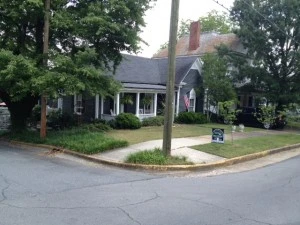 There has been quite a bit of excitement in the Georgia bankruptcy world this past month because the bankruptcy exemption for a residence was raised to $21,500.00 for an individual and $43,000.00 for a married couple. Can you protect the equity in rental homes? Click here to read the blog post I wrote on the bankruptcy exemption for a residence.
There has been quite a bit of excitement in the Georgia bankruptcy world this past month because the bankruptcy exemption for a residence was raised to $21,500.00 for an individual and $43,000.00 for a married couple. Can you protect the equity in rental homes? Click here to read the blog post I wrote on the bankruptcy exemption for a residence.
This past week, I spoke to a potential bankruptcy client who wanted to know if this increase in the bankruptcy exemption for a residence would also protect the rental houses that he owns. He asked: “Can I Protect the Equity in Rental Homes?” The answer is no. This new increase in the exemption amount protects only your residence.
However, Georgia has a wildcard exemption that can be used to protect a little bit of equity in rental house. The maximum for an individual is $5,600.00 and for a married couple it is $11,200.00.
What happens if you own rental homes with more equity than the exemption will protect?
Lets say you have a rental house in Calhoun, GA. Suppose this house in Calhoun is worth $100,000.00 and you owe $80,000.00. If a person wanted to protect this asset with these set of facts, they would have to file Chapter 13 bankruptcy. In a Chapter 13, the exposed equity could be protected by paying back the unsecured pool of debt the same amount of money that they would receive if a trustee sold the rental house.
How do you calculate exposed equity?
First, we need to estimate how of the sale proceeds would have to be paid to a real estate agent for selling house. Most trustees will allow a 10 percent commission in a bankruptcy sale. If we sold the house in Calhoun for $100,000.00, $10,000.00 would be the real estate commission. Take the remaining amount ($90,000.00) minus what is owed ($80,000.00) and you get the exposed equity ($10,000.00).
In an individual Chapter 13 case with these facts, the exposed equity ($10,000.00) minus the wildcard ($5,600.00) = the amount that must be paid to the unsecured pool ($4,400.00).
Hypothetically, a person could file Chapter 13 and wipe out all of their credit cards, medical bills, and any other unsecured debt as long as their plan paid a total of $4,400.00 to the unsecured class.
In contrast, if a person with this facts above filed a Chapter 7 bankruptcy, the trustee could sell the rental house use the proceeds that are not protected by the wildcard to pay unsecured creditors. In the example above, a Chapter 7 trustee could sell the rental house and pay $4,400.00 minus trustee fees to the unsecured creditors.
Can they take your rental houses if they are your only source of income?
The answer to this question is yes. Just because the rental house is your only source of income will not stop a Chapter 7 trustee from liquidating it.
If you own rental houses and are considering bankruptcy, make a list of every house you own. On your list, describe the value of each home and how you determined the value. You will also need to list the amount owed as well.
This list will help your bankruptcy attorney determine the right direction of your case.
3. How much does it cost to file?
4. How do I stop a garnishment?
5. How do I stop a foreclosure?
6. Bankruptcy and exempting equity of your house in Georgia.
